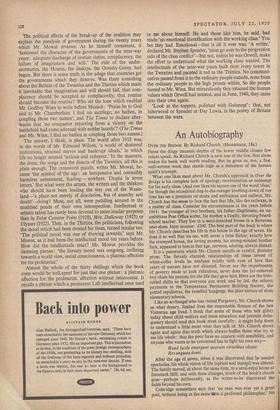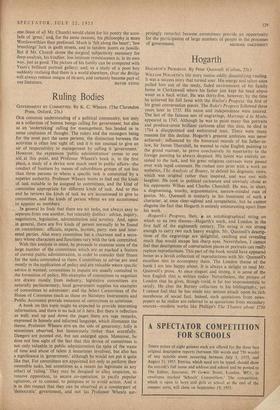An Autobiography
OVER THE BRIDGE. By Richard Church. (Heinemann, 18s.) FROM the dingy miasmic depths of the lower middle classes few voices speak. As Richard Church is now one of the few, that alone makes his book well worth reading. But he gives us, too, a fine, well-written work that stands high as a testament of the human spirit's triumph.
What one likes most about Mr. Church's approach in Over the Bridge is his complete lack of apology, recrimination or contempt for his early class. (And one likes his square use of the word 'class,' for though the occasional dog-in-the-manger levelling-down of our time has set a premium on strata and ambiances and milieux, Mr. Church has the sense to face the fact that life, like the railways, is a matter of class. Consider his circumstances in the years before 1914: the younger of two brothers, his father illegitimate, an un- ambitious Post Office sorter, his mother a kindly, thrusting board- school teacher. They live in a semi-detached house in a Battersea near-slum. Joint income: £240. The best part of the book is where Mr. Church describes his life in this house to the age of seven. He does it so well that we see, with never a false flicker, exactly how the cramped house, the loving parents, his strong-minded brother Jack, appeared to him at that age, nervous, adoring, always distant.
It is a panorama which Mr. Church unrolls in careful, plummy prose. The fiercely clannish relationships of these lowest of white-collar levels he analyses mildly, with eyes of love that years of success have not dimmed. Never are the impedimenta of poverty made to look ridiculous, never does the far-removed boy chide his parents for the life they gave him. Here are the time- tabled shifts so that everyone can work and be fed, the solemn payments to the Temperance Permanent Building Society, the potted aspidistras, the tasselled hangings, the idiot torture of slum elementary schools.
Like an archangel who has visited Purgatory, Mr. Church shows us what dreary, limited lives the respectable flotsam of the late Victorian age lived. I think that some of those who talk glibly today about child welfare and mass education and juvenile delin- quency should read this book most carefully: it might help them to understand a little more what they talk of. Mr. Church shows again and again that truth which always baffles those who try to see life whole : that the poor have no concern with sensibility, and anyone who wants to be concerned has to fight his own way- Haud facile emergunt quorum virtutibus obstat Res angusta domi.
After the age of seven, when it was discovered that he needed spectacles, his whole vision of life (optical and mental) was altered. The family moved, at about the same time, to a semi-rural house at Denmark Hill; and with these changes, much of the book's charm goes—perhaps deliberately, as the writer-to-be discovered the fields beyond his own.
Coleridge somewhere says that 'no man was ever yet a great poet, without being at the same time a profound philosopher.' No
one (least of all Mr. Church) would claim for his poetry the acco- lade of 'great,' and, for the same reasons, his philosophy is more Wordsworthian than profound. Much is 'felt along the heart'; 'low breathings' lurk in gaslit streets, and in tandem jaunts en famine. But if Mr. Church shuns the surgical subjectivity necessary for deep-analysis, his kindlier, less intimate reminiscence is, in its own way, just as good. The picture of his family can be compared with Yeats's brilliant portrait gallery; and, as a study of a poor boy suddenly realising that there is a world elsewhere, Over the Bridge will always remain unique of its sort, and certainly become part of



















































 Previous page
Previous page